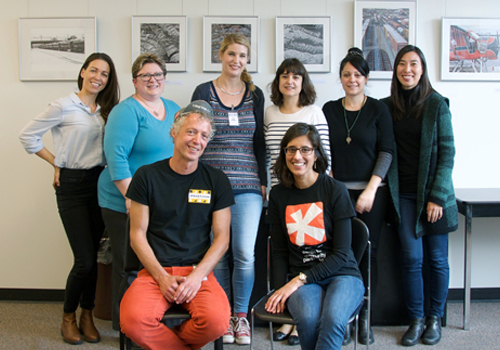An internship at University of Toronto Schools (UTS) wasn’t originally on Stefana Gargova’s graduate school to-do list, but she is delighted to be among the first participants in iPRAKTIKUM, an internationalization and experiential learning project of the Department of Germanic Languages & Literatures.
This fall, iPRAKTIKUM offered paid internships to four graduate students to work under the supervision of Nicola Townend, who runs the German program at UTS.
“We have been talking for a long time about what we can do for students to increase their professional opportunities and have been considering internships like this for a while,” said Stefan Soldovieri, an associate professor of German in the Faculty of Arts & Science who leads iPRAKTIKUM along with Helena Juenger, the department’s senior secretary and graduate assistant. Natasha Jamal at U of T’s Centre for Community Partnerships is also playing a key role in mentoring the interns. “It’s been a truly collaborative effort,” said Juenger.
Read more about our graduate students and graduate education in the Faculty of Arts & Science.
“Many of our graduate students already have experience as teaching assistants, so they will be an asset to a secondary school and can enrich the experience for high school students,” said Soldovieri.
iPRAKTIKUM has funding from Milestones & Pathways in the Faculty of Arts & Science, an initiative designed to support professional development for graduate students, as well as from the Advancement in Teaching and Learning in Arts & Science (ATLAS) program.
Having a PhD doesn’t mean your only option is working in academia.
Gargova, who earned her PhD this fall and is currently pursuing a master’s degree at OISE, had originally planned to teach at the university level, but recognized that jobs can be scarce. “Having a PhD doesn’t mean your only option is working in academia. You can apply all of your skills to many other fields.”

Gargova’s main interest is curriculum development, so she will spend her internship developing two new units for the German classes at UTS: one will focus on LGBTQ issues and the other on Indigenous peoples.
“Germany has a history of representing Indigenous people in a very specific way,” Gargova said. “It will be interesting to look at the portrayals.”
Townend is overseeing the work of the interns and is delighted with Gargova’s plans.
“These are both areas identified in the high school curriculum that have a real dearth of teaching materials set up for classroom use,” she said. “There aren’t many resources, so these units will be useful here and elsewhere.”
For Shirin Oghatian, the internship experience is entirely different. Oghatian, who immigrated to Canada from Iran two years ago, is pursuing a master’s degree in German theory, text and literature. At UTS, she is teaching the Grade 9 German class.
I had just been focused on teaching at colleges, so this has opened a whole new avenue.
“I’ve had teaching assistant opportunities, but this is a totally different experience,” she said. “Teens acquire language differently than older students, based on the way younger brains work. Prior to this, they were beyond my comfort zone, but this makes me think about new opportunities. I had just been focused on teaching at colleges, so this has opened a whole new avenue.”
In addition to the boot camp and regular feedback from Townend, Soldovieri and Juenger explain that the graduate students are required to attend a check-in session midway through the internship to ensure their individual learning goals are being met, as well as a debriefing at the end of the semester. Current interns are also expected to help the Department of Germanic Languages & Literatures prepare the next cohort of iPRAKTIKUM interns.
If the program is as successful as it appears, Soldovieri and Juenger envision expanding the program to other high schools and to other industries where German language skills can be an asset. As iPRAKTIKUM grows, future interns will also be placed with organizations in German-speaking countries.

